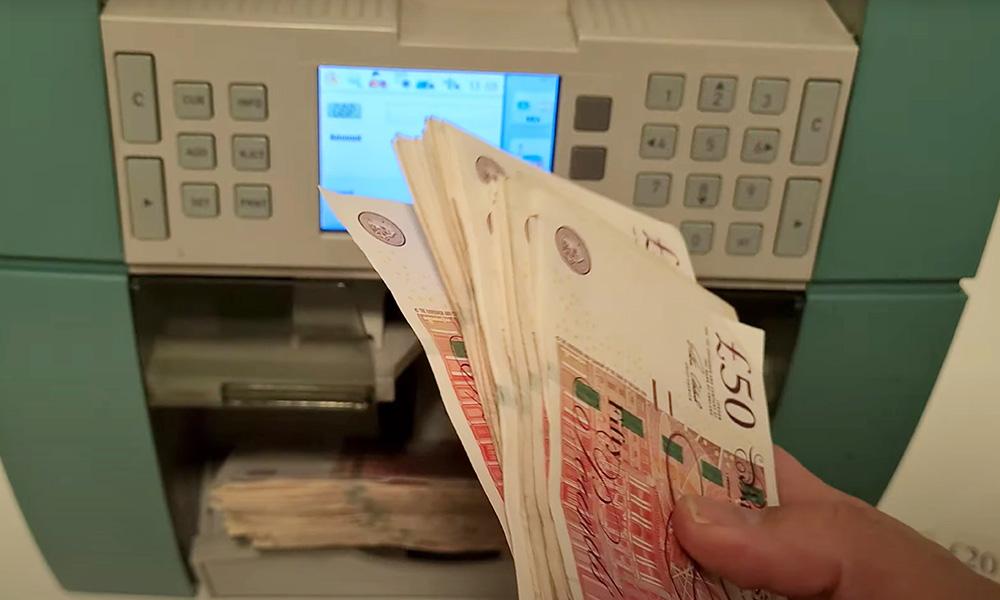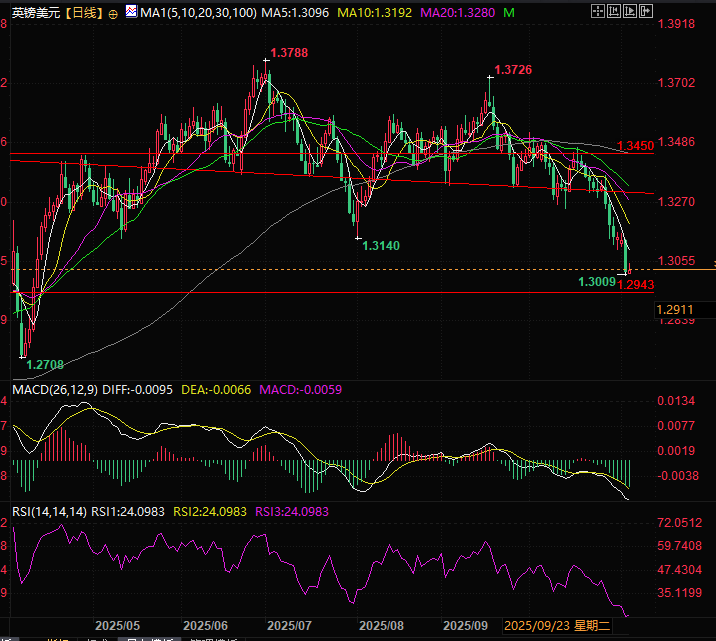The US ADP report revealed oversold signals; is the pound's rebound a trap or an opportunity?
2025-11-05 21:58:51
The ADP data released by the United States showed that the number of employed people in September was revised upward from -32,000 to -29,000, while the number of employed people in October was 42,000, exceeding the expected 25,000. Wages increased by 4.5%. However, since the ADP data previously collected were based on the normal operation of the US government, and the operation of government departments has a certain crowding-out effect on the private sector economy, the market may believe that this better-than-expected ADP data cannot objectively reflect the situation of the US labor market.
Meanwhile, the change of 42,000 people is also a relatively small figure in the history of ADP.

The market's main focus recently has been on Rachel Reeves' speech at Downing Street. This article summarizes the overall content of the speech.
In his speech, he expressed his intention to strike a prudent balance, emphasizing fiscal discipline while not ruling out the possibility of tax increases.
The British Chancellor of the Exchequer emphasized fiscal discipline while not ruling out the possibility of tax increases, a statement that pushed up British government bonds but put pressure on the pound and the stock market.
The market interprets this as a signal that the government remains committed to controlling public finances, even if it means facing difficult choices in the future. While the Chancellor's focus on productivity and "equitable growth" offered few specific policy details, the overall intent was clear enough.
His remarks sent UK government bonds higher, with the yield on 30-year bonds falling by about 4 basis points at one point, as investors interpreted the speech as a signal of a cautious fiscal stance.
The initial easing of sentiment was evident, but as is often the case with political speeches, the gains faded as the trading day progressed due to a lack of concrete content. The market is now anticipating more specific measures.
The pound has been under pressure for some time, and Reeves' stance of not ruling out further tariffs has failed to effectively boost market confidence. Coupled with the strengthening of the dollar due to conflicting statements from Federal Reserve officials, the continued decline of the pound against the dollar is not surprising.
Expectations of a Bank of England rate cut are rising.
Traders are increasing their bets on a looser monetary policy from the Bank of England, with market pricing now indicating a 28% probability of a rate cut this week and a 68% probability of one before the end of the year. This shift reflects market concerns about the momentum of UK economic growth and the impact of tighter monetary policy.
The Bank of England has been cautious about cutting interest rates too early, fearing a rebound in inflation, but market pricing suggests that this patience is gradually wearing thin.
The coexistence of a weakening pound and falling UK government bond yields creates a unique backdrop for the Bank of England's next move. On the one hand, lower bond yields provide the central bank with greater room for easing; on the other hand, a weaker pound could push up imported inflation, thus limiting its ability to cut interest rates significantly. It's a delicate balancing act.
Interest rate expectations are influenced not only by domestic UK data but also by broader global circumstances. Conflicting statements from Federal Reserve officials have led to market skepticism about the path of US interest rates, which in turn affects the Bank of England's decision-making space. Central banks do not operate in isolation; the recent strengthening of the US dollar reflects this interconnectedness.
Currently, the market is betting that the Bank of England will adopt a gradual easing strategy rather than a large-scale one. The Bank of England wants to see more evidence that inflation is truly under control before embarking on a sustained rate-cutting cycle. However, with growing growth concerns and rising political pressure, the overall policy direction is quite clear.
Budget commitments and business tax reform
Reeves has pledged a budget focused on fairness and investment, including reforms to business tax rates to accommodate the digital economy. This reform is long overdue—the current system disadvantages brick-and-mortar retailers while making things relatively easier for purely online businesses. However, details matter, and we won't know the specifics of the reforms until the fall budget is released.
The Chancellor of the Exchequer undeniably emphasized that productivity is key to growth, but his wording was somewhat vague. Productivity gains cannot be achieved overnight; they require investment in infrastructure, skills, and technology. Without concrete measures to drive these gains, this rhetoric is merely empty talk.
It's understandable that markets are skeptical of political promises. Successive Chancellors of the Exchequer have addressed similar issues over the years, yet UK productivity growth remains weak. The key lies in execution, not vision, and this is what investors will be focusing on in the coming months.
Yesterday's speech lacked detail, leaving the market still clueless about the actual contents of the budget. Will there be tax increases? Which taxes? By how much? These questions remain unanswered, leaving businesses and investors in a wait-and-see mode. Uncertainty offers little benefit to market sentiment.
Company updates bring some positive news.
Despite a challenging environment for energy companies, BP delivered a pleasant surprise, exceeding earnings expectations. The oil giant reaffirmed its commitment to a $4 billion divestment, indicating management remains focused on portfolio optimization and balance sheet robustness. While BP's share price has failed to make significant progress this year, this performance at least lays the foundation for share price stability.
AB Foods has announced that it is considering splitting up its discount clothing chain, Primark.
These kinds of corporate initiatives have the potential to unlock value because Primac operates in a market segment quite different from United Foods' sugar and ingredients business. Whether they will ultimately be implemented remains to be seen, but the very initiation of the evaluation indicates that management is engaging in creative thinking about the company's structure.
These corporate developments stand out particularly against the backdrop of a generally sluggish market. When overall market sentiment is weak, company-specific news has a greater impact on individual stock performance. Investors are looking for contrarian themes, and the developments of BP and United Foods at least offer some directions worth considering.
Global risk appetite remains low
European stocks fell across the board, with the UK market merely following the trend of the continental European market. Concerns about growth, overvalued technology stocks, and uncertainty surrounding monetary policy intertwined, fueling market caution. When risk appetite is so fragile, few factors are needed to push the market down; the lack of positive catalysts is sufficient.
The continued strengthening of the US dollar has further exacerbated the pressure, particularly impacting commodity producers and companies with substantial overseas earnings. A strong dollar tends to put pressure on risk assets because it increases the cost of dollar-denominated commodities and reduces the value of overseas earnings when converted into dollars. This is undoubtedly a headwind for the FTSE 100 index, which is heavily weighted towards mining and energy stocks.
Recent trading volumes have been relatively thin, indicating that many market participants are currently preferring to remain on the sidelines. This lack of confidence means that the market could decline even without a clear catalyst—simply because there are insufficient buyers to absorb the selling pressure. For bulls waiting for a catalyst to drive a sustained rally, the current market environment is undoubtedly frustrating.
Technical Analysis:
The pound fell below the neckline of a double top pattern against the dollar, with a measured decline around 1.2943.
However, since the RSI is close to 20, it indicates that the market is severely oversold and a rebound is imminent.

(GBP/USD daily chart, source: FX678)
At 21:57 Beijing time, the British pound is currently trading at 1.3025/24 against the US dollar.
- Risk Warning and Disclaimer
- The market involves risk, and trading may not be suitable for all investors. This article is for reference only and does not constitute personal investment advice, nor does it take into account certain users’ specific investment objectives, financial situation, or other needs. Any investment decisions made based on this information are at your own risk.





















